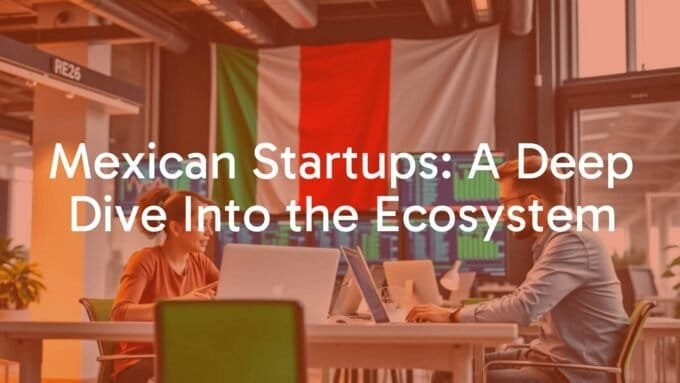Mexico’s startup scene is in a lively upswing, changing industries and drawing large amounts of investment. But what defines these fast-moving Mexican startups, and why has Mexico become such a strong place for new companies? The answer comes from a mix of fresh ideas, a fast-growing digital market, and a strategic location, powered by a new wave of tech-focused founders and a supportive, even if still maturing, ecosystem.
From shaking up financial services with new fintech tools to overhauling e-commerce and logistics, Mexican startups follow and shape global trends. This article will look at the main features of this growing scene, the industries being changed, the cities leading the way, and the standout companies placing Mexico on the global startup map.
What Defines Mexican Startups?
Mexican startups tend to be quick on their feet, solve local problems with smart approaches, and use technology to reach wide and often underserved groups. They are becoming major players across Latin America, showing fast growth and drawing large investments.
Key Features of the Mexican Startup Ecosystem
The Mexican startup scene mixes big chances with real hurdles. Creativity often comes from the need to fix gaps and inefficiencies in the market. Many companies are quite young; for example, the average Mexican fintech is under three years old. This youth brings a new view and openness to new tech and business models.
Another core trait is fast adoption of digital tools, in a country where many people were unbanked or underbanked for years. Rising smartphone and internet use-over 80 million people online-has created a good place for digital-first companies. This digital fluency, plus a strong pool of tech talent, lets Mexican startups scale quickly and reach large audiences, tackling everything from financial inclusion to logistics challenges.

Popular Industries for Mexican Startups
Innovation takes place across many fields, but some areas stand out:
- Fintech leads, with 500+ companies and over 20% of national venture funding, driven by the need for accessible finance.
- E-commerce and retail are growing fast, helped by a 23% sector growth rate and more online shoppers.
- Software and data platforms support operations, analytics, and open banking.
- Mobility, logistics, and supply chain tools improve delivery and cross-border trade.
- Proptech modernizes real estate, while healthtech expands access to care.
Benefits and Challenges of Launching a Startup in Mexico
On the plus side, Mexico’s large market of 128.5 million people offers big growth potential. A young, tech-aware population means both customers and talent. Also, Mexico’s location offers access to Latin America and North America, making it a strong base for regional expansion.
But there are hurdles. The 2018 “Ley Fintech Mexico” was a landmark step to build a more regulated environment, yet working through these rules can be hard and costly for new companies. Many startups, especially in fintech, still depend on traditional banks and foreign tech, which can limit them. Access to capital is improving but still tough for some early-stage teams. And meeting the needs of rural groups with limited digital access remains a big challenge for those aiming for true financial and social inclusion.
Why Is Mexico a Hotspot for Startup Growth?
Mexico’s rise as a startup hub comes from several factors that create a good setting for new ideas. A dynamic economy and a growing need for digital solutions attract attention at home and abroad.
Funding Landscape: Investors and Programs in Mexico
Funding in Mexico has changed a lot, with strong capital flows from local and global investors. In Q2 2024, startups raised $791 million, up 25% from the prior quarter. This jump shows strong investor confidence. In Mexico City alone, venture investment reached $3.4 billion, showing the city’s central role.
Backers like Founders Fund, Ribbit Capital, General Atlantic, and SoftBank are active, especially in fintech. Programs and accelerators such as Finnovista play a key role, supporting early-stage teams. Average funding among top startups is about $54.3 million, and a mix of rounds from pre-seed to Series C means options for many stages. The many global investors show Mexico is an appealing place to invest.
Government Initiatives and Startup Regulations
The Mexican government sees the potential of startups and has rolled out measures to support growth. A major step was the 2018 “Ley Fintech Mexico,” making Mexico one of the first countries with a broad fintech law. It sets rules for areas like collective finance and creates “sandboxes” to test new products, aiming to protect users and investors while supporting innovation.
Following these rules can be a mixed bag. They build trust and safety but can be heavy for smaller teams, who must budget for legal and consulting help to meet the rules. Even with these details, the government’s active role shows a commitment to growing the ecosystem, signaling stability to investors.
Access to Talent and Tech Resources
Mexico’s fast-growing talent pool is a big strength. Mexico City is now the largest digital talent hub in Latin America, with nearly 300,000 tech specialists. This depth of skill gives startups a solid base to build new products and services.
Also, big tech firms like Google, Amazon, and Microsoft have set up in Mexico, adding to a strong tech culture and knowledge sharing. Universities and coding bootcamps play an important role in upskilling people in AI, cloud, and software development, so there is steady new talent. A focus on B2B tools and infrastructure-big data, analytics, and open platforms-helps startups use advanced technology.
Mexico vs Other Latin American Startup Hubs
In Latin America, Mexico stands out as a major startup center, often second only to Brazil by size. While Brazil is larger overall, Mexico’s steady growth and location give it an edge. Its closeness to the United States and strong trade links create chances for nearshoring and cross-border work, especially in logistics and e-commerce.
By focusing on local needs such as financial inclusion, Mexico has built sharp, high-impact solutions. Colombia and Chile are also strong in fintech, but Mexico’s large population and big unbanked segment mean more room to make change. The rise of several unicorns strengthens Mexico’s role, drawing more investment and talent.
Which Industries Are Mexican Startups Changing?
Mexican startups are building companies and remaking traditional sectors, and even creating new markets. Digital tools touch every field, but some see especially big changes.
Fintech: Digital Payments, Lending, and Crypto
Fintech is the leading area in Mexico’s startup scene. It is full of new ideas, driven by a large unbanked and underbanked population. Clip is changing digital payments by helping small businesses that once used only cash accept electronic transactions. With a $2 billion valuation and a $100 million investment from Morgan Stanley Tactical Value in 2024, Clip serves over 800,000 businesses, showing the impact of easy payment tools.

Digital lending is also growing fast. Kueski offers quick online micro-loans, using AI to set credit limits fast. Its BNPL partnership with Amazon Mexico lets customers split payments and fits a cash-heavy market. Neobanks like Klar and Albo offer no-fee digital banking and aim to replace traditional bank needs with full mobile services. In crypto, Bitso is the largest platform in Latin America, handling a daily trading volume over $3.6 trillion and moving into DeFi tools. This wave of fintech innovation aims for profit and wider access to finance for millions of people.
Ecommerce and Retail Startups
Online commerce and retail in Mexico are growing fast, with a 23% sector growth rate. Startups are building new marketplaces and delivery options. Kavak, a unicorn valued at $9 billion, changed the used car market with a digital platform, financing, and quality checks. Its 240-point inspection and fast payout to sellers set a high bar.
Jüsto is an online-only grocery that delivers a wide range of items to homes, making shopping easier. GAIA leads in furniture e-commerce with a simple buying experience. Ben & Frank offers stylish, affordable eyewear online, updating a traditional model. These startups provide convenience and expand access to goods across the country.
Software and Data Platforms
Strong software and data platforms are at the core of any digital economy, and Mexican startups add a lot here. Skydropx simplifies logistics with software that helps businesses handle shipments well. Zubale gives brands and retailers tools for crowdsourced work, improving e-commerce operations. Envíoclick connects companies across Latin America to freight, courier, and fulfillment through a cloud platform, showing how software can improve supply chains.
Beyond logistics, BELVO leads in open banking, letting companies and developers securely access and read end-user financial data, sparking more fintech innovation. B2B tools are growing too, like HR platform Worky and analytics platform Pulsar. This shows a strong push to raise business efficiency and use data for better decisions.
Mobility, Logistics, and Supply Chain
Given Mexico’s location and role in global trade, mobility and logistics are ripe for new ideas. Nowports, a digital freight forwarder valued at $1.1 billion, is changing logistics in Latin America by tackling delays and lost containers. It offers real-time tracking, automated documents, and AI-based predictive tools, greatly improving international shipping.
Micromobility options like Grin Scooters (now part of Grow Mobility) give eco-friendly rides in cities. Companies like Skydropx and Envíoclick, mentioned above, help optimize delivery and freight. The push for nearshoring, moving production closer to end markets, makes fast, efficient logistics even more important, and Mexican startups are providing important tech support.
Proptech and Real Estate Solutions
Real estate in Mexico is going through a digital shift. Flat.mx, now Clau.com, started as an iBuyer and grew into a full real estate platform with about 80,000 listings, cutting sales times from months to days. It uses 200-point inspections and legal reviews to bring clarity and trust to a market that was often unclear.
Morada Uno and others are also growing in real estate, backed by strong Series A rounds. These companies use tech to simplify buying, selling, and managing homes, helping both owners and developers. A focus on middle-income housing and expanding into services like mortgage brokerage shows a broad approach to modernizing real estate in Mexico.
Other Important Sectors: Healthtech, Edtech, and More
Beyond the major fields, startups in Mexico add value in other important areas. In healthtech, Eva created a wearable device for breast cancer risk checks that is simple and non-intrusive. Plenna and Mendel also raised strong rounds, showing investor interest in this area.
Edtech is growing too. Vinco builds tools to upskill and reskill workers, meeting demand for ongoing learning. Environmental tech (e.g., EcoTrove) and gaming (e.g., Agonalea Games) also see fresh investment and new products. This range of activity shows how broad and active Mexico’s startup energy is.
Which Mexican Cities Lead in Startup Activity?
While the ecosystem grows across the country, some cities are clear leaders with strong communities of founders, investors, and talent. These places are more than simple locations; they are active hubs that help new ideas grow.
Mexico City: A Startup Powerhouse
Mexico City is the main center of the country’s startup scene. It is Latin America’s biggest digital talent hub, with nearly 300,000 tech specialists. This deep talent base, high population density, and strong infrastructure make it a good place for new ventures.

The city attracts a large share of venture capital, with about $3.4 billion flowing to its startups. Many of the country’s most successful companies-Kavak, Clip, and Bitso-are based here. Fintech names like Klar, Fondeadora, and Stori Card, e-commerce players like Jüsto and GAIA, and proptech companies like Flat.mx (now Clau.com) also call it home. The high volume and variety of activity, plus many accelerators and co-working spaces, keep Mexico City among the leading startup cities worldwide.
Guadalajara: Tech and Innovation Cluster
Often called the “Mexican Silicon Valley,” Guadalajara has built a strong role as a tech and innovation center. It is a hub for software, IT services, and new startups. Top universities and a history of multinational tech firms in the city support a skilled workforce and an innovation mindset.
Guadalajara hosts well-known startups like Kueski (micro-loans) and yotepresto (lending marketplace). Pulpos in e-commerce and INDACAR in automotive data are other examples. The city’s collaborative culture and supportive community attract tech people and founders who want to build and scale.
Monterrey and Other Fast-Growing Hubs
Monterrey is quickly becoming another key hub. With a strong industrial base and closeness to the US border, it excels in logistics, manufacturing, and B2B tools. Skydropx (logistics software) and Nowports (digital freight forwarder) started here, using the city’s location strengths.
Other rising hubs also add to the story. Puebla, for example, is home to healthtech players like NUBIX. These regional clusters show spread-out growth, where local strengths and needs spark new ideas. This diversity makes the overall ecosystem more resilient and active.
What Are the Leading Mexican Startups to Watch?
Mexico’s startup scene is a lively mix of new ideas and bold founders. Several companies now stand out in Mexico and abroad, showing strong potential and market impact.
Top Unicorns and High-Growth Companies
Mexico has six unicorn startups (valued at over USD 1 billion), which shows the ecosystem is maturing. Kavak, an online market for used cars, leads with a $9 billion valuation. Since 2016, it has changed auto buying with tech-driven checks and financing, and it now operates in seven countries.
Clip, a major digital payments platform, is valued at $2 billion and plays a big role in helping small and mid-sized businesses accept card payments, boosting financial access. Bitso, the largest crypto platform in Latin America, is also a unicorn, showing strong adoption of digital assets. Nowports, a digital freight forwarder, is valued at $1.1 billion, and Konfío, a fintech platform for SMEs, stands at $1.3 billion. These wins support Mexico’s place as a hub for disruptive innovation.
| Company | Sector | Recent Valuation | Focus |
|---|---|---|---|
| Kavak | E-commerce/Auto | $9B | Used car marketplace and financing |
| Clip | Fintech/Payments | $2B | Digital payments for SMEs |
| Bitso | Crypto/Fintech | Unicorn | Crypto exchange and DeFi services |
| Nowports | Logistics | $1.1B | Digital freight forwarding |
| Konfío | Fintech/SME | $1.3B | Credit and tools for small businesses |
Best Funded Startups: 2024-2025 Overview
Funding for Mexican startups remains strong. As of September 2025, companies like Konfio, Jüsto, and Kueski rank among the best funded. Konfio has raised $85 million to keep growing SME credit tools.
Recent 2025 rounds show ongoing investor interest across fields. Kapital raised $100 million (Series C) in August 2025. Klar raised $170 million (Series C) in July 2025. Plata closed a $160 million Series A in March 2025. These big rounds show confidence in Mexico’s ability to scale companies.
Most Innovative Early-Stage Mexican Startups
A fresh wave of early-stage teams is breaking new ground. Eva is building a wearable for breast cancer risk detection with a simple, non-invasive approach. HadosBiotec uses microalgae for gene editing in food and cosmetics, showing deep scientific work.
In fintech, new names like Zumma and Nonco have landed seed and venture funding, showing a steady flow of ideas. Salmon Labs focuses on AI and analytics, and Antal Capital on cloud and AI. These young companies, while not yet unicorns, are key to the ecosystem’s future.
How Do Startups in Mexico Attract and Keep Talent?
In a fast-growing and competitive market, finding and keeping great people is very important. Mexican startups are using modern ways to build skilled teams and strong cultures.
Top Hiring Startups and Job Opportunities
Growth in startups leads to more jobs for tech workers and other skilled roles. Axity, Resuelve tu Deuda, and AlphaCredit are among the top hiring companies, with median team sizes of 1001-5000, and they invest in training and growth.
Tech roles are set to grow by about 25%, with demand for developers, data scientists, marketers, and operations managers. Startups in AI, fintech, and cloud are hiring the most, offering good career paths in cutting-edge fields. Mexico City’s nearly 300,000 tech specialists help keep the job market active and competitive.
Startup Culture and Work Environment in Mexico
Startups in Mexico often build open, inclusive workplaces that blend local values with fast ways of working. Teams focus on collaboration, new ideas, and community. Many offer flexible work, growth programs, and flatter structures, which appeal to younger workers.
Creative problem-solving and adaptability are key traits in fast-moving teams. Companies invest more in well-being and work-life balance, knowing an engaged team supports steady growth. This focus helps attract people looking for both a job and a mission-driven place where they can make a clear impact.
Remote Work, Global Teams, and International Hiring
The global move to remote work is helping Mexican startups hire from a wider pool, both in Mexico and abroad. Flexibility also appeals to people who want better balance and location freedom. Many companies now run global teams that bring diverse skills and views.
The growing presence of multinational tech firms in Mexico and the nearshoring trend support cross-border teamwork and global hiring. Mexican startups now attract both local and foreign talent, building diverse teams. Running global teams well is becoming a big advantage.
What Are the Current Trends and Outlook for Mexican Startups?
Mexico’s startup landscape is changing all the time, pushed by new tech, shifting demand, and more founders. Knowing the current trends and future direction matters for anyone engaging with this space.
Recent Funding Rounds and Market Expansions
From 2024 to 2025, funding activity stayed strong. In August 2025, Kapital closed a $100 million Series C, and Momento (insurance and auto) raised $10.25 million (Series A). Klar secured $170 million (Series C) in July 2025. These investments show ongoing confidence, especially in fintech and other fast-growth areas.
Beyond fundraising, many startups are expanding in Latin America and globally. Kavak operates in seven countries, and Bitso plans moves into markets in Africa and Southeast Asia. This outward push shows Mexican products can scale to global needs. Nearshoring also boosts logistics and supply chain startups.
Mergers, Acquisitions, and Exits in the Mexican Ecosystem
As the ecosystem matures, more mergers, acquisitions, and exits are appearing-good signs of a healthy market. These events give early backers and founders liquidity, which encourages more investment and new ventures. One example is Incode acquiring MetaMap in 2024, pointing to a trend of consolidation as leaders get stronger.
Rising valuations across unicorns suggest larger exits are likely ahead. As companies prove lasting business models, they draw interest from bigger firms or public markets. This cycle then brings in more talent and capital.
Predicted Growth Areas and Challenges Ahead
Looking forward, several areas should keep growing: fintech (payments, lending, blockchain), driven by ongoing needs in financial inclusion; and AI and cloud, which support progress across many fields.

Challenges remain. Rules can slow innovation even while adding structure. Gaps between urban and rural access to fintech still need attention to make growth fair. Many startups also rely on foreign tech and traditional banking systems, which shows room to grow local tech capacity. Even with these hurdles, the outlook is very positive, with strong founder energy, a growing talent base, and rising investor interest pointing to continued success well past 2025.
Frequently Asked Questions about Mexican Startups
How Many Startups Operate in Mexico in 2024?
As of September 2025, StartupBlink lists 1137 top startups in Mexico. The number shifts as new ventures launch and others change course, but steady funding and a large flow of new companies show an active, fast-growing scene.
What Is the Legal Framework for Startups in Mexico?
Mexico has a forward-looking set of rules for startups, led by the 2018 “Ley Fintech Mexico.” It covers areas like collective financing and “regulatory sandboxes” for testing new products. While it supports innovation and protects users, startups often need to spend on legal and consulting work to meet these rules. The framework keeps changing to match the pace of new technology.
What Sets Successful Mexican Startups Apart?
- They spot and solve big market gaps, especially around financial inclusion and digital access for underserved groups.
- They use AI, cloud, and data analytics to build scalable, efficient products.
- They have strong leadership and flexible models that can work through a tricky set of rules.
- They focus on customer experience and trust, which is especially important in finance and other sensitive fields.














Leave a comment